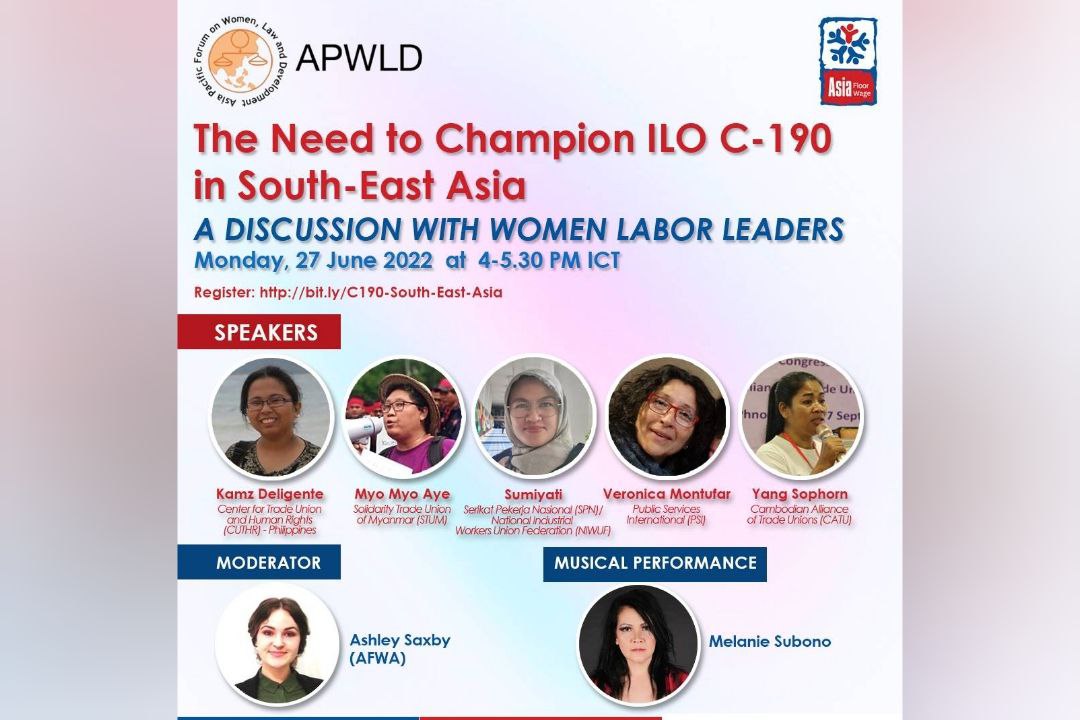The Need to Champion ILO C-190 in South-East Asia: A Discussion with Women Labor Leaders

The Need to Champion ILO C-190 in South-East Asia: A Discussion with Women Labor Leaders
Join Asia Floor Wage Alliance (AFWA) and Asia Pacific Forum on Women, Law and Development (APWLD) for a conversation with women trade union leaders from Southeast Asia on what ratification of C-190 would mean for garment workers. #RatifyC190
Date / Time: 27 June, 2022 at 4 pm – 5.30 pm ICT
The webinar happened over Zoom and was streamed live on Facebook here: https://fb.watch/e2IFQbonGf/
Moderator: Ashley Saxby, South-East Asia Coordinator & Gender Coordinator, AFWA
Speakers:
- Yang Sophorn, Cambodian Alliance of Trade Unions (CATU), Cambodia
- Sumiyati, Serikat Pekerja Nasional (SPN), National Industrial Workers’ Union Federation (NWUF), Indonesia
- Kamz Deligente, Center for Trade Union and Human Rights (CUTHR), the Philippines
- Myo Myo Aye, Solidarity Trade Union of Myanmar (STUM), Myanmar
- Veronica Montufar, Public Services International (PSI), Ecuador
Special musical performance in Bahasa Indonesia and English by labor activist Melanie Subono
On 21 June, 2019, the International Labour Organization adopted the Violence and Harassment Convention, 2019 (C-190) and its accompanying Recommendation No. 206 (R206), as a result of the global movement led by women workers, trade union leaders and civil society. The significance of these landmark standards, recognizing the widespread problem of gender-based violence and harassment (GBVH) at all workplaces and the right of workers to be free of GBVH in its numerous forms, cannot be overstated.
In the three years since the adoption of C-190, a global pandemic unleashed unprecedented and far-reaching impacts on the health and livelihoods of millions of workers in global garment supply chains, disproportionately impacting women workers. The COVID-19 pandemic also underscored how the risk of violence and harassment is heightened during times of crisis, as women garment workers have seen the escalation of GBVH in its various forms in factories, having ripple effects to the home. Domestic violence also increased, used as a disciplining force in the family, similar to how GBVH is used as an industrial tactic of discipline in the factory. Further, garment workers have witnessed widespread political decay and repression, and the rollback of hard-won labour rights. GBVH itself is an impediment to women’s ability to organize, and access other labour and human rights. Ratification of C-190 is now more urgent than ever.
Few countries have ratified C-190 and only one in Asia and the Pacific. In Southeast Asia, where the garment industry is a lifeline to millions of women workers, GBVH remains a persistent feature of work in the factory and at home. Trade unionists, labour rights defenders, workers and feminist activists across the region continue to advocate and fight for ratification, and for the elimination of GBVH.
To register for this event please visit the following URL: →
